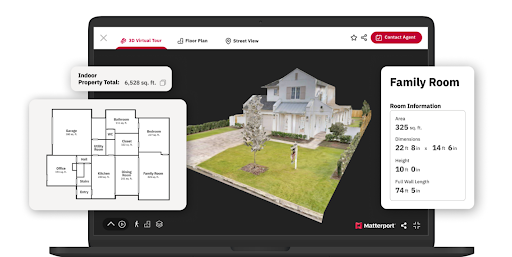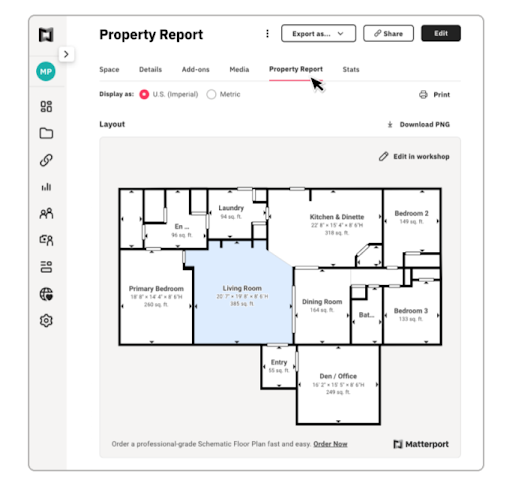Written by
November 04, 2024
AI in Real Estate: How To Use Technology To Elevate Your Marketing
SHARE THIS POSTReal estate agents, homeowners, and home buyers face a rapidly changing landscape, and Artificial intelligence is proving to be the solution for staying ahead. By adopting AI-powered tools, they transform how properties are marketed, bought, and managed, creating a seamless and smarter real estate experience for everyone involved.
From being able to offer virtual tours to producing critical documentation faster, the benefits of AI technology keep pushing boundaries, reshaping the real estate industry in ways that continue to impress. And, modern platforms like Matterport are making it more available than ever before (but more on that a bit later).
10 Benefits of using AI in real estate
In real estate, success often hinges on speed, insight, and precision—all of which AI delivers in abundance. These 10 benefits showcase how AI is setting new standards in the industry. But keep in mind that AI is rapidly developing, so this list will only get longer over time!
1. Personalized customer experience with enhanced property search
Many popular real estate sites integrate machine learning (ML) and AI to deliver a more personalized experience for homebuyers. These solutions allow for automated recommendations based on a user’s search preferences, viewing history, and interests.
As a result, realtors get more traction on property listings, but more importantly, help buyers find the right home, faster.
For example, using AI, you can create email campaigns that are tailored to a user’s experience and history. This can allow you to quickly send emails that feature listings the person has previously looked at, listings they might like, and more. And, all without the time investment it takes to manually put an email together.
2. Better Understanding of a Property and How the Space Can Be Used
Using AI-powered Property Intelligence can bring useful context to property listings on a per-room basis and give buyers a clearer picture of accessibility and how they would use or modify a space.
For example, Airbnb was met with “expected growing demand” of accessible accommodations in Paris during the Olympics and Paralympics. To address this, Airbnb collaborated with paralympic athletes, Axel Alletru and Sofianne Mehiaouiand, as well as Matterport, in order to use digital twin technology to identify “step-free” Airbnb listings that were able to support accessibility needs during the event.
3. Improved Lead Generation
AI enables real estate agents to engage potential buyers continuously, ensuring a steady flow of quality leads. First, the aforementioned enhanced property search can help properties get in front of those most likely to be interested in them. Next, there are real estate AI chatbots that can engage with buyers 24/7. These chatbots can answer customer questions, surface appropriate listings, collect customer data for agents, and more.
4. Predictive Analytics for Trend Analysis and Price Prediction
Artificial intelligence for real estate is great at parsing through large amounts of data, analyzing it, and identifying trends. This can allow you to look at historical data, analyze it with AI-powered tools, and determine what kind of inventory or pricing you might have to prepare for.
Not only can AI help with forecasting, it can also help you with property valuation based on the current real estate market. This enables your real estate business to keep property values competitive but fair, and frees up your real estate professionals to spend less time on pricing and more time connecting with buyers and sellers.
5. Intelligent Data Processing
Real estate companies deal with tons of data, documentation, and legalese. All of this is difficult and time-consuming to process, taking away time and resources you could use to push your agency forward.
New technologies powered by AI facilitate intelligent data and document processing, helping quickly process various documents and agreements, streamline leases or rent, and countless other data-related workflows.
It’s even possible to use APIs to build advanced real estate databases or tools that are tailored to perform specific functions for your organization. These AI-driven tools can pull from your large datasets and provide real-time market data, insights on your inventory, and countless other use cases.
6. Due Diligence Automation
Along with advanced data processing, comes due diligence automation. With real estate AI, you can streamline and fully automate much of the due diligence process, including the creation and review of numerous legal documents.
Some AI is even capable of going through existing documents to help you find any trends or insights, which can help you further improve your efforts in the long haul.
7. Improved Predictive Maintenance
Strategic AI integration allows you to sync up with any data collection tools or trackers, and then have your system tell you when property maintenance needs may arise. Furthermore, you can use AI-driven digital twins and virtual tours to make the inspection of properties easier, whether you’re there or not.

Digital twins are invaluable in manufacturing and real estate, especially if you’re managing multiple properties.
8. More Accurate Renovation and Remodel Costs
In a similar vein as maintenance, AI can also be an invaluable tool for renovation cost estimations in an efficient way. Digital twins offer a combination of 3D spatial visualization as well as accurate property measurements and layouts that can help property owners, buyers, or tenants scope and plan projects down to each line item that is required of any project, big or small.
9. More Direct Tenant Communication
Direct and frequent tenant communication is crucial to providing a better experience for your tenants, and for getting ahead of issues before they arise as a landlord. With AI for real estate, you can use chatbots and the like to keep lines of communication open. These bots can offer AI-generated responses that direct people to the right resource, or capture the right information for follow-ups.
For example, with an AI-powered chatbot, you could give tenants a way to easily field any potential maintenance or billing issues. From there, the message can be routed to you or the appropriate person to handle during business hours. Think of these cutting-edge bots as your own AI assistant.
10. Automated Property Inspection/Appraisal or Condition Tracking of Rentals
Property inspections or appraisals take a substantial amount of time. But, trying to speed them up can result in costly mistakes that turn into financial headaches, or worse, maintenance disasters down the road.
Pairing AI with scanning technology can allow you to create and analyze digital twins of a space quickly. From there, you can easily inspect these for any issues or maintenance needs, and even tag them for further review.

You can then use AI to run a market analysis and help with appraising the value of the property. This allows you to get the property listed ASAP and in front of potential buyers. And for lenders, this makes it possible to determine the correct value before making a decision.
Real-Life Applications of AI in Real Estate
There are countless theoretical applications for AI in real estate. But, there are already numerous real-life applications as well, from streamlining design to guiding investments and beyond.
Property Management
One of the biggest challenges with property management is trying to be in a million places at once. This is an area where AI, partnered with digital twins, can have a large impact—not just in streamlining operations but also in improving how property management services are marketed.
Using a digital twin platform, like Matterport, you can quickly scan and capture any existing property. From there, you can make an accessible digital twin that allows you to “be” at a property from your desk.
Partnered with AI, you can take advantage of advanced property intelligence, which allows for more informed decisions around maintenance and management. For instance, Matterport Property Intelligence makes it possible to automatically receive accurate dimensions and measurements for structures. On top of this, you can easily adjust walls in the Property Layout view, and receive an updated Property Report that details any changes.
All of this allows you to stay in the loop, even if you’re far away. With more accurate and up-to-date information, you can have improved decision-making for maintenance, offer data-driven support to landlords, and stay on top of property management with ease, even at commercial real estate levels.
Virtual Tours
Whether you’re renting, selling, or buying, virtual tours are a great addition to the real estate experience. And AI is making them better than ever.
AI in real estate is making it possible to create virtual tours that are even more accurate and accessible, with accurate dimensions mapped to every inch of the space, improved navigation for exploring the space, and the ability to create virtual tours even faster.
Zumper the largest privately-held rental marketplace in the U.S., partnered with Matterport to offer virtual tours of the many rental spaces on their market. With Matterport, Zumper could offer digital twin-powered virtual tours that, using AI, featured detailed 3D spaces with 99% accuracy for measurements.

These virtual tours allowed potential renters to see a space, determine if it’s the right fit, and then make an informed decision without even visiting. In the end, more than 70% of renters decided to move forward with a rental agreement, without ever physically visiting the space.
Tour Experiences
Not only is AI allowing for more detailed and accurate digital twins and virtual tours, it’s also helping agents get more out of the actual tours. With the right AI, it’s possible to see how visitors explore a virtual tour, much like one can analyze a visitor’s behavior on a site.
ArchiTwin helps countless retail and manufacturing companies through use of detailed digital twins and virtual tours powered by Matterport. But they take things a step further, using AI to analyze visitor behavior and paths through virtual tours. From there, they can help their clients tweak their tours to get even more out of them, whether trying to sell a space or help employees better-navigate a digital workspace.
Documentation and Listing Creation
Whether you’re listing a property to sell or rent, accurate documentation and listings for that space are crucial to delivering a great buying experience. Fortunately, there are real estate AI solutions that can expedite this process.
FBS, owner of the FlexMLSⓇ platform, recently partnered with Matterport to launch a listing completion feature for all their agents. Flexmls users will be able to auto-fill dimensional data directly from their Matterport digital twins, including room name, length, and width, and automatically populate that data in the Flexmls interface. Matterport’s AI-powered Property Intelligence automatically extracts measurements, dimensions, and room names from Matterport digital twins, providing prospective home buyers with accurate dimensional property data.This eliminates manual data entry for agents and back office staff, saving time and minimizing errors and omissions. Flexmls users will also gain efficiency through the seamless upload of Matterport media, including photos, floor plans, and videos.

Knutson Construction specializes in helping healthcare centers and universities by delivering accurate, structurally sound work. Because they work with such large spaces and clients, documentation and measurements often take a substantial amount of time.
By partnering with Matterport, Knutson was able to quickly scan spaces, using the Matterport Pro2 for interiors. With the Matterport platform, these scans are combined to create digital twins with accurate measurements, saving their team the time of having to manually measure. This allowed them to make documentation 2x faster and decrease site visits by 75%.
Short-Term Rental Listings
Vrbo, an online marketplace for vacation rentals, has partnered with Matterport to enhance the user experience for short-term vacation rental listings.
By offering immersive virtual tours and digital twins of each property, this partnership has increased bookings by up to 15%. Incorporating digital twins into the listing increases engagement and differentiates a property from others in the market. The additional spatial context from digital twins improves communication efficiency as travelers will be able to have a clear perspective of the property before booking.
Unlock Real Estate Potential with a New Generation of AI Tools
Before harnessing the power of real estate AI, it’s good to have a plan. AI tools can get costly, and having a planned approach will help you choose the right ones and avoid throwing resources around.
Steps to Unlock Real Estate Potential
1. Establish goals: Before you do anything, it’s important to have goals for your AI use. Pick a major pain point or two to focus on first. Do you need help engaging leads via email? Predicting market trends? Offering virtual tours?
2. Define a budget: Make a budget and stick to it. Going over budget will make any AI gains moot.
3. Make sure you’re ready: Virtually every tool will require the right data and access to it. If you don’t have the right data, or tools in place to collect it, you’re looking at additional setup work and costs before getting started with AI.
4. Shop around: Explore your options, keeping your goals, budget limitations, and data-readiness in mind. Different solutions will have different data and platform requirements.
5. Check for support: Ideally, you want a solution that offers great support, as issues can arise. A company without great support will result in an AI tool that’s dead in the water, wasted resources, and frustrations for your team.
6. Try out a solution: Finally, test out a solution. If a free trial is available, that’s ideal. If not, pick a low-tier package and put the AI solution through the wringer.
Most tools will specialize in one area or another, offering marketing support or design support. Let your business goals be your north star, helping you sift through tools you don’t need, or don’t need yet.
Ideally, you can find a tool that checks all the right boxes. For instance, Matterport Property Intelligence, part of the Matterport platform, uses AI to automate measurements, pull property data, and more. On top of this, you can leverage Matterport digital twins to create lifelike spaces, opening the door to virtual tours, advanced maintenance, and improved property management.
The future of AI in real estate is here. To learn more, check out the Matterport Winter 2024 release